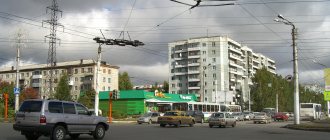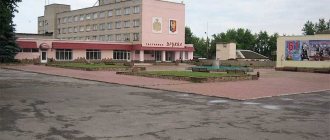| Flag of Iskitim | Coat of arms of Iskitim |
| A country | Russia |
| Subject of the federation | Novosibirsk region |
| Municipal district | Iskitimsky district |
| Population | ▼60,072[1] people (2010) |
| Chapter | Victor Genrikhovich Pfeiffer |
| Vehicle code | 54, 154 |
| Timezone | UTC+7 |
| Density | 2143 people/km² |
| City with | 1938 |
| Ethnobury | Iskitimtsy, Iskitimets, Iskitimka |
| Telephone code | +7 38343 |
| Center height | 130 m |
| Coordinates | Coordinates: 54°38′00″ N. w. 83°18′00″ E. d. / 54.633333° n. w. 83.3° east d. (G) (O) (I)54°38′00″ n. w. 83°18′00″ E. d. / 54.633333° n. w. 83.3° east d. (G) (O) (I) |
| Based | 1717 |
| Square | 29.9 km² |
| OKATO code | 50 412 |
| Postal codes | 63320x |
View of the city of Iskitim from the east
Old coat of arms of the city
Iskitim is a city (since 1938) in Russia, the administrative center of the Iskitimsky district of the Novosibirsk region, a city of regional subordination. Part of the Novosibirsk agglomeration.
Population
The population of the city is 60.1 thousand people (2010).
| Year | Population, (thousand people) |
| 1939 | 14.0 |
| 1959 | 34.3 |
| 1973 | 51.0 |
| 2006 | 63.8 |
| 1967 | 45.0 |
| 1992 | 69.2 |
| 1989 | 67.8 |
| 2005 | 63.8 |
| 2003 | 62.8 |
| 1970 | 45.4 |
| 1979 | 58.7 |
| 1976 | 57.0 |
| 1996 | 69.0 |
| 2009 | 64.0 |
| 1986 | 68.0 |
| 1998 | 68.6 |
| 2000 | 68.3 |
| 2007 | 64.1 |
| 2008 | 64.1 |
| 2001 | 68.6 |
| 1982 | 62.0 |
Modern times
During the Great Patriotic War, thousands of city residents went to fight, few of them returned to their hometown. In 1951, Iskitim became a city of regional subordination, which stimulated economic development and accelerated demographic development. In 1959, the population of Iskitim was 34,320 people, more than twice the pre-war number. Labor resources arrived in the region from all over the country. The local building materials industry has been greatly stimulated by increased construction volumes in the regional center. In 1967, the population of Iskitim grew to 45,000 people.
In 1973, the number of Iskitim residents exceeded 50,000 for the first time; 51,000 people lived in the city. The following years are characterized by active construction of engineering infrastructure, landscaping and construction of new residential neighborhoods and industrial enterprises. Demand for building materials continues to outstrip supply. The population is growing largely due to labor coming from the former Soviet republics. In 1987, the maximum number was reached - 69,000 people. In subsequent years, long periods of decline in the number of inhabitants alternated with short periods of growth. In 2022, 57,032 people lived in Iskitim, Novosibirsk region.
Story
Iskitim: from the name of the indigenous tribal group of Ashkitims living in the area; from Turkic - “pit” or “bowl”, indeed the city is located in a basin; unsubstantiated version: from the word “search” (people who came here were constantly looking for something: clean waters, fertile lands, minerals)
In 1717, the villages appeared: Shipunovo, Koinovo, Chernodyrovo and Vylkovo. In 1929, geologists found limestone and shale in the area. From 1930 to 1934 the Chernorechensky cement plant was built. In 1933, the working settlement of Iskitim appeared, formed from the surrounding villages. In 1938 it was given city status.
general information
Iskitim is located on the banks of the Berd River, the right tributary of the Ob, 26 km from the regional city. It is the administrative center of the district of the same name. The area of the city of Iskitim is 29.9 sq. km. Located in the south-eastern part of the Novosibirsk region. Iskitim railway station is located at a distance of 57 km. from Novosibirsk-Glavny. The Novosibirsk-Biysk highway passes through the city.
Since the 1930s, the basis of Iskitim's industry has been enterprises producing building materials. Cement, stone-processing and slate factories, a building materials plant and many others are still operating. From enterprises in other industries, you can also find a plant for the production of synthetic fiber.
Culture
There are cultural institutions in Iskitim: houses of culture - “Youth” (Industrial microdistrict), “Tsementnik” (Northern microdistrict), “October” (in the Lozhok microdistrict), RDK im. Leninsky Komsomol (Central microdistrict), as well as the Rossiya Palace of Culture (Southern microdistrict).
Iskitim City History and Art Museum
The Iskitim Museum was opened to visitors on November 4, 1977. The museum was initially formed in two directions and is complex, consisting of two departments: historical and artistic. The museum stores 24 collections, more than 19 thousand exhibits. The most ancient are the exhibits of the paleontological and archaeological collections. The most modern are materials indicating the participation of Iskitim people in the Chechen wars. Storage units: 19,839, of which fixed assets: 17,248, including: ethnographic collection - 1,759 units, icon collection - 200 units, numismatics collection - 3,898 units, natural history collection - 563 units, photos and documents from the collection "IN. M. Shukshin. Life and Creativity" - 250 units.
Cinemas
- Cinema in the Palace of Culture named after. Lenin Komsomol
- Cinema named after Mayakovsky (now the building has been purchased, it houses the Mayakovsky MRK)
- Cinema in the Oktyabr Palace of Culture
- Cinema in the Rossiya Palace of Culture
Excerpt characterizing Iskitim
Prince Vasily, as if not listening to the ladies, walked to the far corner and sat down on the sofa. He closed his eyes and seemed to be dozing. His head fell and he woke up. “Aline,” he said to his wife, “allez voir ce qu’ils font.” [Alina, look what they are doing.] The princess went to the door, walked past it with a significant, indifferent look and looked into the living room. Pierre and Helene also sat and talked. “Everything is the same,” she answered her husband. Prince Vasily frowned, wrinkled his mouth to the side, his cheeks jumped with his characteristic unpleasant, rude expression; He shook himself, stood up, threw his head back and with decisive steps, past the ladies, walked into the small living room. With quick steps, he joyfully approached Pierre. The prince's face was so unusually solemn that Pierre stood up in fear when he saw him. - God bless! - he said. - My wife told me everything! “He hugged Pierre with one hand and his daughter with the other. - My friend Lelya! I'm very, very happy. – His voice trembled. - I loved your father... and she will be a good wife for you... God bless you!... He hugged his daughter, then Pierre again and kissed him with a foul-smelling mouth. Tears actually wet his cheeks. “Princess, come here,” he shouted. The princess came out and cried too. The elderly lady was also wiping herself with a handkerchief. Pierre was kissed, and he kissed the hand of the beautiful Helene several times. After a while they were left alone again. “All this had to be this way and could not have been otherwise,” thought Pierre, “so there is no need to ask whether it is good or bad? Good, because definitely, and there is no previous painful doubt.” Pierre silently held his bride's hand and looked at her beautiful breasts rising and falling. - Helen! - he said out loud and stopped. “Something special is said in these cases,” he thought, but he could not remember what exactly they say in these cases. He looked into her face. She moved closer to him. Her face flushed. “Oh, take off these... like these...” she pointed to the glasses. Pierre took off his glasses, and his eyes, in addition to the general strangeness of the eyes of people who took off their glasses, looked fearfully questioning. He wanted to bend over her hand and kiss it; but with a quick and rough movement of her head she captured his lips and brought them together with hers. Her face struck Pierre with its changed, unpleasantly confused expression. “Now it’s too late, it’s all over; “Yes, and I love her,” thought Pierre. - Je vous aime! [I love you!] - he said, remembering what needed to be said in these cases; but these words sounded so poor that he felt ashamed of himself. A month and a half later, he was married and settled, as they said, the happy owner of a beautiful wife and millions, in the large St. Petersburg newly decorated house of the Bezukhyh counts. The old Prince Nikolai Andreich Bolkonsky in December 1805 received a letter from Prince Vasily, informing him of his arrival with his son. (“I’m going on an inspection, and, of course, it’s not a 100-mile detour for me to visit you, dear benefactor,” he wrote, “and my Anatole is seeing me off and going to the army; and I hope that you will allow him to personally express to you the deep respect that he, imitating his father, has for you.”) “There’s no need to take Marie out: the suitors themselves are coming to us,” the little princess said carelessly when she heard about this. Prince Nikolai Andreich winced and said nothing. Two weeks after receiving the letter, in the evening, Prince Vasily’s people arrived ahead, and the next day he and his son arrived. Old Bolkonsky always had a low opinion of the character of Prince Vasily, and even more so recently, when Prince Vasily, during the new reigns under Paul and Alexander, went far in rank and honor. Now, from the hints of the letter and the little princess, he understood what was the matter, and the low opinion of Prince Vasily turned in the soul of Prince Nikolai Andreich into a feeling of malevolent contempt. He snorted constantly when talking about him. On the day Prince Vasily arrived, Prince Nikolai Andreich was especially dissatisfied and out of sorts. Was it because he was out of sorts that Prince Vasily was coming, or because he was especially dissatisfied with the arrival of Prince Vasily because he was out of sorts; but he was not in a good mood, and Tikhon in the morning advised against the architect coming in with a report to the prince. “Can you hear how he walks,” said Tikhon, drawing the architect’s attention to the sounds of the prince’s steps. - He steps on his entire heel - we already know... However, as usual, at 9 o’clock the prince went out for a walk in his velvet fur coat with a sable collar and the same hat. It snowed the day before. The path along which Prince Nikolai Andreich walked to the greenhouse was cleared, traces of a broom were visible in the scattered snow, and a shovel was stuck into the loose mound of snow that ran on both sides of the path. The prince walked through the greenhouses, through the courtyards and buildings, frowning and silent. - Is it possible to ride in a sleigh? - he asked the venerable man who accompanied him to the house, similar in face and manners to the owner and manager. - The snow is deep, your Excellency. I already ordered it to be scattered according to the plan. The prince bowed his head and walked up to the porch. “Thank you, Lord,” thought the manager, “a cloud has passed!” “It was difficult to get through, your Excellency,” added the manager. – How did you hear, your Excellency, that the minister will come to your Excellency? The prince turned to the manager and stared at him with frowning eyes. - What? Minister? Which minister? Who ordered? – he spoke in his shrill, harsh voice. “They didn’t clear it for the princess, my daughter, but for the minister!” I have no ministers! - Your Excellency, I thought... - You thought! - the prince shouted, pronouncing the words more and more hastily and incoherently. – You thought... Robbers! scoundrels! “I will teach you to believe,” and, raising a stick, he swung it at Alpatych and would have hit him if the manager had not involuntarily deviated from the blow. - I thought so! Scoundrels! – he shouted hastily. But, despite the fact that Alpatych, himself frightened by his audacity to dodge the blow, approached the prince, obediently lowering his bald head in front of him, or maybe that’s why the prince continued to shout: “scoundrels! throw up the road! He didn’t pick up his stick another time and ran into the rooms. Before dinner, the princess and M lle Bourienne, who knew that the prince was out of sorts, stood waiting for him: M lle Bourienne with a beaming face that said: “I don’t know anything, I’m the same as always,” and Princess Marya - pale, frightened, with downcast eyes. The hardest thing for Princess Marya was that she knew that in these cases she had to act like m lle Bourime, but she could not do it. It seemed to her: “If I act as if I don’t notice, he will think that I have no sympathy for him; I’ll make it look like I’m boring and out of sorts, he’ll say (as it happened) that I’m hanging my nose,” etc. The prince looked at his daughter’s frightened face and snorted. “Dr... or stupid!...” he said. “And that one is gone! They were already gossiping about her too,” he thought about the little princess, who was not in the dining room. -Where is the princess? - he asked. “Hiding?...” “She’s not entirely healthy,” said Mlle Bourienne, smiling cheerfully, “she won’t come out.” This is so understandable in her situation. - Hm! hmm! ugh! ugh! - said the prince and sat down at the table. The plate did not seem clean to him; he pointed to the spot and threw it. Tikhon picked it up and handed it to the barman. The little princess was not unwell; but she was so insurmountably afraid of the prince that, having heard how out of sorts he was, she decided not to go out. “I’m afraid for the child,” she said to m lle Bourienne, “God knows what can happen from fright.” In general, the little princess lived in Bald Mountains constantly under a feeling of fear and antipathy towards the old prince, which she was not aware of, because fear was so dominant that she could not feel it. There was also antipathy on the part of the prince, but it was drowned out by contempt. The princess, having settled down in the Bald Mountains, especially fell in love with m lle Bourienne, spent her days with her, asked her to spend the night with her, and often talked to her about her father-in-law and judged him. “Il nous arrive du monde, mon prince,” said M lle Bourienne, unrolling a white napkin with her pink hands. – Son excellence le prince Kouraguine avec son fils, a ce que j'ai entendu dire? [His Excellency Prince Kuragin with his son, how much did I hear?] - she said questioningly. “Hm... this boy of excellence... I assigned him to the college,” the prince said offended. “Why son, I can’t understand.” Princess Lizaveta Karlovna and Princess Marya may know; I don’t know why he’s bringing this son here. I don't need it. – And he looked at his blushing daughter. - Unwell, or what? Out of fear of the minister, as that idiot Alpatych said today. - No, mon pere. [father.] No matter how unsuccessfully M lle Bourienne found herself on the subject of conversation, she did not stop and chatted about greenhouses, about the beauty of a new blossoming flower, and the prince softened after the soup. After dinner he went to his daughter-in-law. The little princess sat at a small table and chatted with Masha, the maid. She turned pale when she saw her father-in-law. The little princess has changed a lot. She was more bad than good now. The cheeks sank, the lip rose upward, the eyes were drawn downwards. “Yes, it’s some kind of heaviness,” she answered when the prince asked what she felt. - Do you need anything? - No, merci, mon pere. [thank you, father.] - Well, okay, okay. He went out and walked to the waitress. Alpatych stood in the waiter's room with his head bowed. – Is the road blocked? - Zakidana, your Excellency; Forgive me, for God's sake, for one stupid thing. The prince interrupted him and laughed his unnatural laugh. - Well, okay, okay. He extended his hand, which Alpatych kissed, and walked into the office. In the evening Prince Vasily arrived. He was met at the prespekt (that's the name of the avenue) by coachmen and waiters, who shouted and drove his carts and sleighs to the outbuilding along a road deliberately covered with snow. Prince Vasily and Anatoly were given separate rooms. Anatole sat, having taken off his doublet and resting his hands on his hips, in front of the table, at the corner of which he, smiling, fixed his beautiful large eyes intently and absent-mindedly. He looked upon his entire life as a continuous amusement that someone like that for some reason had undertaken to arrange for him. Now he looked at his trip to the evil old man and the rich ugly heiress in the same way. All this could have turned out, he supposed, very well and funny. Why not marry if she is very rich? It never interferes, Anatole thought. He shaved, perfumed himself with care and panache, which had become his habit, and with his innate good-natured, victorious expression, holding his handsome head high, he entered his father’s room. Two valets were busy around Prince Vasily, dressing him; He himself looked around animatedly and nodded cheerfully to his son as he entered, as if he were saying: “So, that’s exactly what I need you for!” - No, no joke, father, is she very ugly? A? – he asked, as if continuing a conversation he had had more than once during the trip. - That's enough. Nonsense! The main thing is to try to be respectful and reasonable with the old prince. “If he scolds, I’ll leave,” said Anatole. “I can’t stand these old people.” A? – Remember that everything depends on this for you. At this time, the arrival of the minister with his son was not only known in the maiden's room, but the appearance of both of them was already described in detail. Princess Marya sat alone in her room and tried in vain to overcome her inner agitation. “Why did they write, why did Lisa tell me about this? After all, this cannot be! - she said to herself, looking in the mirror. - How do I get out into the living room? Even if I liked him, I couldn’t be on my own with him now.” The thought of her father's gaze terrified her. The little princess and m lle Bourienne had already received all the necessary information from the maid Masha about what a ruddy, black-browed handsome minister's son was, and about how daddy dragged them with force to the stairs, and he, like an eagle, walking three steps at a time, ran after him. Having received this information, the little princess and M lle Bourienne, still audible from the corridor in their animated voices, entered the princess’s room. – Ils sont arrives, Marieie, [They arrived, Marie,] do you know? - said the little princess, wobbling her belly and sitting heavily on the chair. She was no longer in the blouse in which she had sat in the morning, but she was wearing one of her best dresses; her head was carefully adorned, and there was a liveliness on her face, which, however, did not hide the drooping and deadened contours of her face. In the attire in which she usually wore to social gatherings in St. Petersburg, it was even more noticeable how much she had looked worse. M lle Bourienne also unnoticed some improvement in her outfit, which made her pretty, fresh face even more attractive. – Eh bien, et vous restez comme vous etes, chere princesse? – she spoke. – On va venir annoncer, que ces messieurs sont au salon; il faudra descendre, et vous ne faites pas un petit brin de toilette! [Well, are you still wearing what you were wearing, princess? Now they will come to say that they are out. We’ll have to go downstairs, but at least you’ll dress up a little!] The little princess got up from her chair, called the maid and hastily and cheerfully began to come up with an outfit for Princess Marya and put it into execution. Princess Marya felt insulted in her sense of self-worth by the fact that the arrival of her promised groom worried her, and she was even more insulted by the fact that both of her friends did not even imagine that it could be otherwise. To tell them how ashamed she was for herself and for them was to betray her anxiety; Moreover, to refuse the outfit that was offered to her would have led to lengthy jokes and insistence. She flushed, her beautiful eyes went out, her face became covered with spots, and with that ugly expression of victim that most often settled on her face, she surrendered to the power of m lle Bourienne and Lisa. Both women cared quite sincerely about making her beautiful. She was so bad that not one of them could think of competing with her; therefore, quite sincerely, with that naive and firm conviction of women that an outfit can make a face beautiful, they set about dressing her.
Why did these settlements appear in the area of the future Iskitim?
There are several reasons. Firstly, at the turn of the 17th-18th centuries, peasant colonization began in Russia, i.e. settlement, Siberia. Secondly, not far from the territory of the future city, the Berdsky fort was erected, which served as protection for the growing villages. Thirdly, natural conditions and resources were favorable for living: the river was a source of fresh water and fish; forests with an abundance of game, mushrooms, berries, and construction materials; fertile soils and water meadows, favorable for agriculture, cattle breeding and beekeeping; flat area, convenient for construction. In addition, the territory of the future Iskitim was located next to the Altai Highway, built in the 19th century, and the Altai Railway, built in 1912.
Literature
- Maksimov, G. Birth of the city / G. Maksimov // Maksimov, G. Iskitim. 20th century: Chronicle-documentary story. – Iskitim: State Unitary Enterprise PA “Mezhdurechye”, 2000. – P. 42.
- Mitrofanova, Yu. Iskitim Studies: Curriculum and methodological manual for the course “Iskitim Studies”. / Yu.Mitrofanova – Novosibirsk, 2004. – 108 p.
- Calendar of significant and memorable dates in the Novosibirsk region / Comp. Lurie E.E., Martynova Yu.G. – Novosibirsk, 2003. – 159 p.
- Petukhov, A. Brainchild of industrialization / A. Petukhov // Isktim newspaper. – 1995. – No. 3. – 11 Jan. – P. 2.
- Balabko, N.A. Distant history of Iskitim: [scientific. Employee Dept. Iski-tim.museum of local history about the formation of the city of Iskitim according to doc. From funds] / N.A. Balabko, // Iskitim newspaper. – 2007. – February 1, 8. – P.14: ill. – (Iskitim is 290 years old).
Source - ""
Categories: Iskitim | Article










